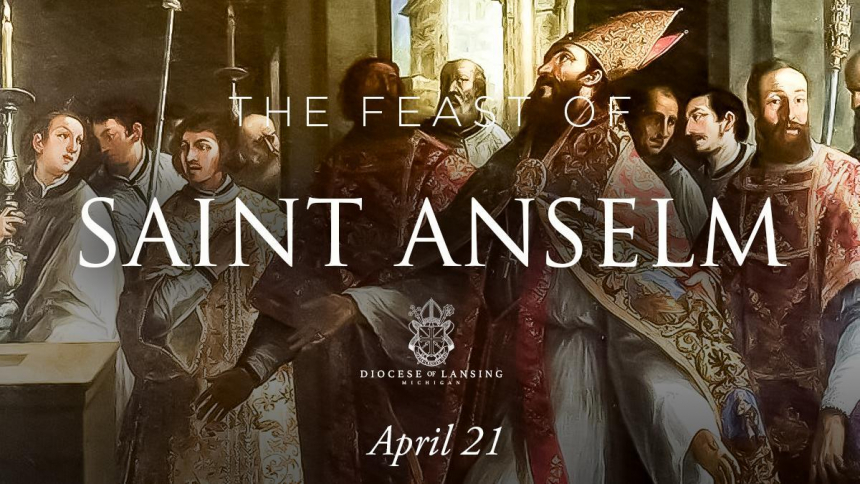
Today is the Feast of Saint Anselm. Happy feast day! The Benedictine monk, who died on this day in 1109, is considered to be the greatest theologian in Western Christianity between the time of Saint Augustine of Hippo in the 5th century and Saint Thomas Aquinas in the 13th century. Despite this, his inspiring life story is not especially well known today … but it should be! So says Michael Andrews, Chancellor of the Diocese of Lansing. Michael writes:
Anselm grew up surrounded by the beauty of the Italian Alps, and as a child, he thought that heaven must be located somewhere on their summits. Though his mother was devoutly religious, his father was quite worldly, and spent lavish amounts of money in extravagant and irresponsible ways.
In his teenage years, Anselm received a calling to enter monastic life as a Benedictine monk. His father objected to his vocation and strongly refused to permit him to pursue it. He had his own hopes and ideals for his bright son, and he flew into a rage that he would want to enter religious life. Practically crushed by his father’s disapproval, Anselm gave up hope. His despondency led him to pursue a worldly life for a time. His mother died, and his father’s oppressiveness became unbearable for him. He left home for France.
The time away allowed him to regain his perspective and he again sensed God’s call to the monastery. Ultimately, he came to Normandy and arrived at the famous Abbey of Our Lady of Bec. Under the influence of his fellow Italian, Lanfranc, Bec Abbey was the focus of spiritual and intellectual activity of the time. Anselm became a monk of the abbey, and later, its abbot. During this time, he wrote his most renowned theological works, the Monologion and Proslogion.
Anselm’s quest can be summarized in the maxim he took from St Augustine: Fides quaerens intellectum that is, "faith seeking understanding." Anselm said: "I do not seek to understand in order that I may believe, but rather, I believe in order that I may understand.” He taught his religious brothers to progress on the path of perfection and to seek God with the intelligence of faith. His emphasis on faith and reason merited him the title “the Father of Scholasticism.”
His responsibilities as abbot called him to England, his third and final destination. Norman lords had given lands in England to the Abbey of Bec, which Anselm was asked to visit. He also visited Lanfranc, his predecessor as abbot, who was now the Archbishop of Canterbury. The monastic chapter at Canterbury was deeply impressed with Anselm’s piety, learning, and gifts for leadership. They hoped that he would one day succeed Lanfranc there, as he had at Bec.
The king, William II, made known his opposition. Anselm himself did not desire to be in a situation in which conflict with the king would be inevitable. He knew that the king was maneuvering himself to seize power over the Church. The king, however, fell gravely ill, and summoned Anselm to hear his confession and give him the last sacraments.
Upon his recovery, the king nominated Anselm as Archbishop of Canterbury. Anselm delayed, and his community at Bec also protested. Finally, Anselm negotiated terms on which he would accept, including a program of moral reform of the clergy and the return of properties the king had seized from the Church.
Ultimately, he was consecrated as archbishop, and despite many difficulties, including exile, Anselm fought valiantly for the liberty of the Church. In 1102, he presided over the Council of London, which condemned the slave trade. His writings reveal a tender devotion to the Blessed Virgin Mary.
In the last months of his earthly life, he was carried every day into church for Mass. He exhorted all those who had the joy to come to him, to live for God according to the vocation God had given them. When his voice failed, he was only able to raise his right hand and make the sign of the Cross when asked for a blessing.
At last, he surrendered his soul to God in the early morning hours of April 21, 1109. He was buried at Canterbury Cathedral, where a chapel stands today in his honor. His canonization was requested by one of his successors, the martyr Saint Thomas Becket.
Saint Anselm was named a Doctor of the Church in 1720 by Pope Clement XI, and he is sometimes referred to as the Doctor Magnificus or Magnificent Doctor and the Doctor Marianus or Marian Doctor.
Hence, today, let us pray: O God, who led the Bishop Saint Anselm to seek out and teach the depths of your wisdom, grant, we pray, that our faith in you may so aid our understanding, that what we believe by your command may give delight to our hearts. Through Christ our Lord. Amen.
